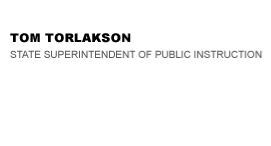Newly operational charter schools, FY 2016-17


Official Letter
Official Letter
December 7, 2016
Dear County Superintendents of Schools, Chief Business Officials, and Directors of Newly Operational Charter Schools:
20 DAY SPECIAL APPORTIONMENT FOR NEWLY OPERATIONAL CHARTER SCHOOLS, FISCAL YEAR 2016–17
In accordance with California Education Code (EC) Section 47652, the California Department of Education (CDE) has made the second of two special apportionments to charter schools that are newly operational this fall. The special apportionment is, in effect, an advance apportionment and is based on the charter school’s first 20 days of actual attendance.
This apportionment in the amount of $33,836,901 is the amount due the charter schools for December 2016 and January 2017 after taking into account monies already apportioned in the first special advance in September 2016. For most schools this equals approximately 18 percent of the charter school’s estimated funding for the 2016–17 fiscal year, calculated pursuant to EC sections 42238.02 and 42238.03, as well as Chapter 6 of Part 26.8 of the EC.
Entitlement Calculations
The entitlement calculations for new charter schools are based on the charter school’s actual average daily attendance (ADA), enrollment, unduplicated pupil counts, and district(s) of charter school physical location reported in the Charter School 20 Day Attendance Report (Charter 20 Day) data collection.
In accordance with the Local Control Funding Formula (LCFF) statutes, each charter school’s LCFF Transition funding is based on the lesser of the charter school’s estimated 2016–17 Target or Floor entitlement. If funded on the Floor, the charter school’s entitlement includes Gap funding equal to approximately 50 percent of the estimated LCFF Need (difference between the LCFF Target and Floor).
A new charter school’s Floor entitlement is determined based on the 2015–16 Floor and Gap funding rate per ADA of the school district in which the charter school is physically located. In addition, the unduplicated pupil percentage (UPP) used for concentration funding included in the LCFF Target entitlement is capped at the lesser of the charter school’s own estimated UPP or the UPP of the district in which the charter school is physically located. If the charter school has more than one physical location, the location with the highest 2015–16 funding rate per ADA and district UPP is used.
The methodology used to estimate the 2016–17 Target and 2016–17 Gap funding is consistent with the methodology used to calculate the regular 2016–17 Advance Principal Apportionment. For more information on the 2016–17 Advance Principal Apportionment calculations, refer to the Apportionment Letter on the CDE’s Principal Apportionment, Fiscal Year, 2016–17 web page at https://www.cde.ca.gov/fg/aa/pa/pa1617.asp. For more information on the LCFF, refer to the CDE’s Local Control Funding Formula web page at https://www.cde.ca.gov/fg/aa/lc/.
Education Protection Account
The state aid calculated in this apportionment is reduced by $200 per unit of ADA to reflect the 2016–17 Education Protection Account (EPA) revenues as established by Proposition 30, The Schools and Local Public Safety Protection Act of 2012. The CDE will allocate EPA revenues on a quarterly basis, meaning local education agencies (LEAs) will receive separate quarterly payments equal 50 percent of their annual EPA entitlement less any amounts previously apportioned in September 2016 (for new charter schools this means a payment of $100 for each unit of funded ADA at the 20-day, less any amounts previously apportioned in September 2016). Note that future payments may be adjusted for ADA changes and previous over-or under-payments of EPA funds. For more information on the EPA is available on the CDE’s Education Protection Account web page at https://www.cde.ca.gov/fg/aa/pa/epa.asp.
Funding In-Lieu of Property Taxes
Also included in this special apportionment is funding to sponsoring school districts that were not basic aid in the prior year to backfill their transfer to charter schools of funding in-lieu of property taxes, for the months of December 2016 and January 2017, which equals approximately 18 percent of most charter school’s projected total in-lieu of property taxes funding for the 2016–17 fiscal year. For most charter schools, EC Section 47632 defines the sponsoring LEA as the district that approved the charter, or in the case of a charter that was denied by a district and subsequently approved by a county office, the district that initially denied the charter.
School districts that were basic aid in the prior year will not receive an Advance apportionment of state aid for in-lieu of property tax. The amount of in-lieu these school districts are required to transfer is provided on the Advance Apportionment Summary for Newly Operational Charter Schools Excel file, but an apportionment of state aid is not reflected in the Advance Payment Schedule for Newly Operational Charter Schools Excel file available on CDE’s Charter School Special Advance Apportionment web page at https://www.cde.ca.gov/fg/aa/pa/chschspcadv1617.asp.
For a county office of education approved charter school whose students do not meet the criteria in EC Section 2574(c)(4), or for a countywide charter whose students reside in a district that was basic aid in the prior year, the sponsoring LEA is the district of residence for those students. That means some county-approved charter schools may have multiple sponsoring districts if the school has students who reside in different districts. The In-Lieu of Property Taxes by District of Residence Excel file provides this detail and is available at the web page address noted in the prior paragraph. For a charter that was denied by an LEA and subsequently approved by the State Board of Education (SBE), the sponsoring LEA is the LEA that initially denied the charter or the LEA designated by the SBE pursuant to paragraph (1) of subdivision (k) of EC Section 47605.
Method for Receiving State Aid
Pursuant to EC Section 47651, for charter schools that elect to receive funding directly, the warrant is drawn in favor of the superintendent of schools of the county in which the LEA that approved the charter is located, for deposit to the appropriate funds or accounts of the charter school in the county treasury. For all other charter schools, the funds are deposited in the appropriate funds or accounts of the LEA that approved the charter.
What’s Next
The amount apportioned to each participating charter school and charter school sponsoring LEA is available on the CDE’s Charter School Special Advance Apportionment, FY 2016–17 web page at https://www.cde.ca.gov/fg/aa/pa/chschspcadv1617.asp.
All communication related to the Principal Apportionment and LCFF funding is available on the CDE’s website, and funding specific information is sent electronically via the CDE’s PASE listserv. The listserv provides LEAs and other interested parties important information, such as notifications regarding LCFF updates, software releases, key deadlines, reminders of due dates for submission of data, and any other pertinent topics related to the Office of Principal Apportionment and Special Education (PASE) and the Office of Charter Apportionments and District Reorganization (CADR). If you do not already belong to the PASE listserv and would like to subscribe, send a "blank" message to: join-pase-contacts@mlist.cde.ca.gov.
If you have any questions regarding this apportionment or about funding for charter schools, please contact the Office of Charter Apportionments and District Reorganization office by phone at 916-324-4541 or by e-mail at PASE@cde.ca.gov.
Sincerely,
Peter Foggiato, Director
School Fiscal Services Division
CM:lk
Enclosure
